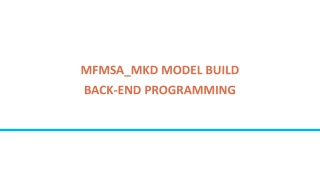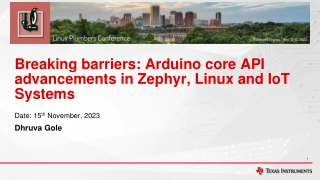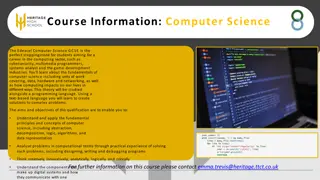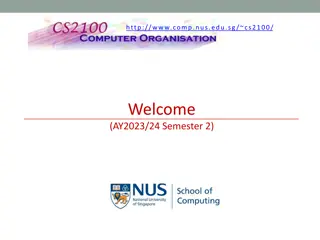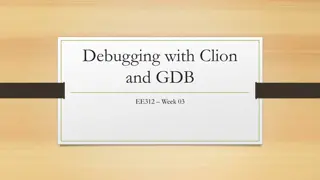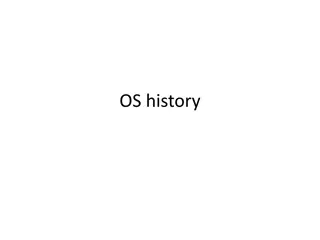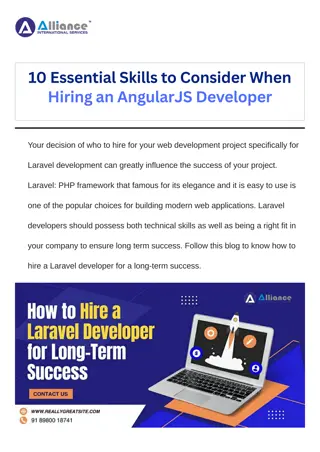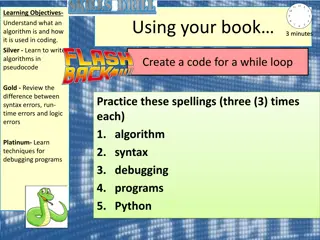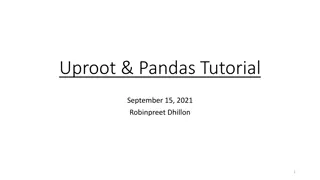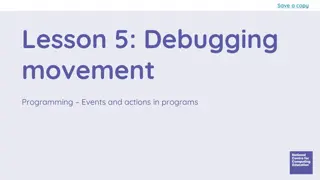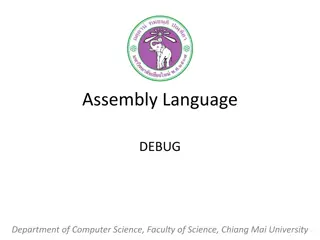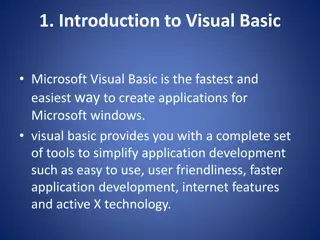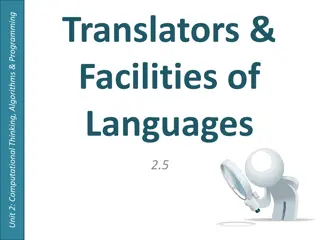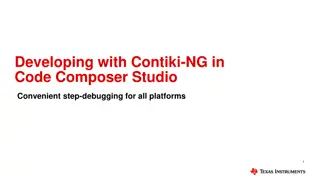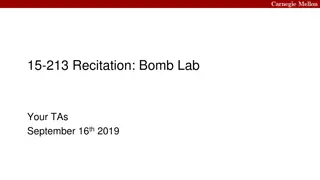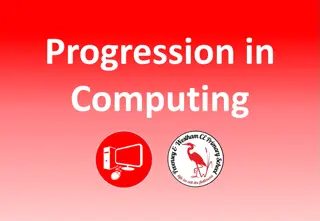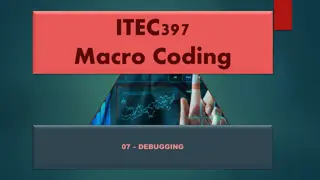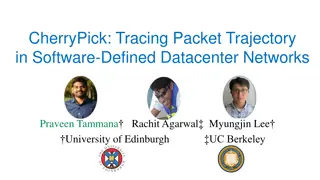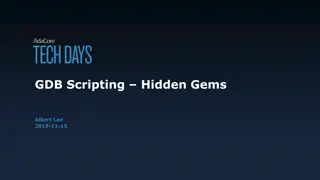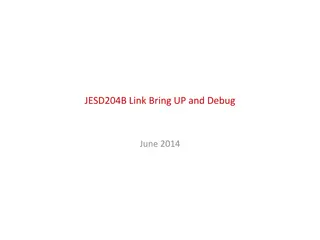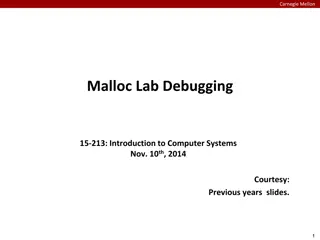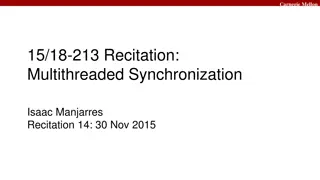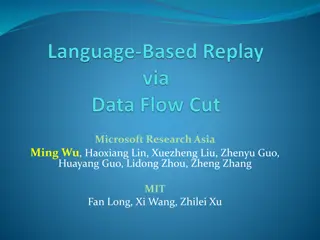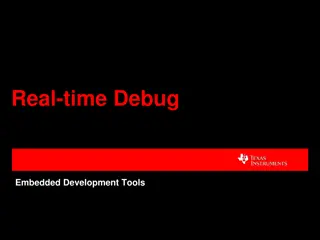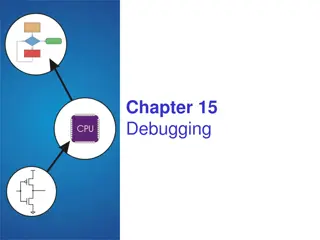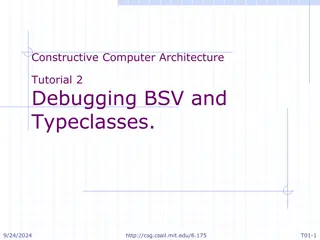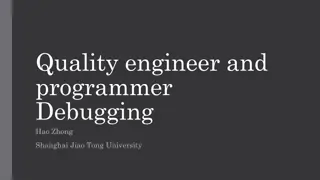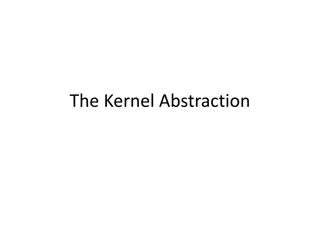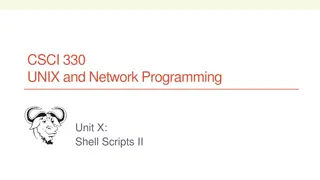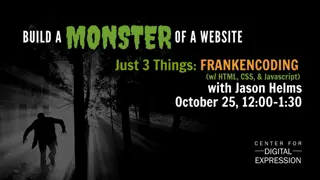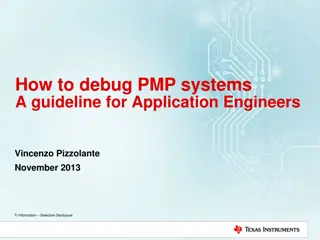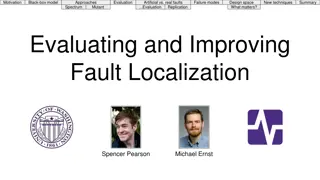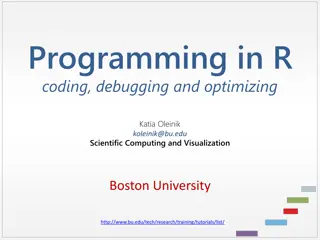Modern End-to-End Programming: Data Preparation, Model Building & Debugging
Prepare, build, debug models covering historical data. Make assumptions, solve equations, ensure data, economic consistency. Iterative processes for accurate simulations.
3 views • 10 slides
Advancements in Arduino Core API with Zephyr and Linux for IoT Systems
Explore the evolution of Arduino Core API with advancements in Zephyr and Linux for IoT systems. Learn how developers can leverage Zephyr RTOS features with Arduino-style syntax, making development easier and more efficient. Discover the benefits of integrating Arduino with Zephyr for enhanced debug
3 views • 30 slides
Explore Edexcel Computer Science GCSE Course Information
The Edexcel Computer Science GCSE is an ideal pathway for students interested in a computing career, covering fundamental computer science principles, practical problem-solving using a programming language, and understanding digital systems. The course focuses on developing creativity, analytical th
1 views • 4 slides
Welcome to CS2100 - Semester 2 AY2023/24
CS2100 is a fundamental computing module at NUS. The course covers topics such as data representation, computer components, C programming, and practical aspects like debugging and software design. Meet the dedicated lecturers, access course materials on Canvas, and dive into the hardware/software st
0 views • 18 slides
Comprehensive Overview of CSE 123 Course by Nathan Brunelle, Spring 2024
Associate Teaching Professor Nathan Brunelle welcomes students to the CSE 123 course at UW, providing insights into course components, learning objectives, tools and resources, assessment methods, and collaboration opportunities. The course emphasizes computational thinking, code comprehension and w
2 views • 30 slides
Effective Debugging Techniques Using Clion IDE and GDB
Understanding the necessity of debugging in code development, exploring common debugging techniques, utilizing GDB for debugging, and working with Clion IDE debugger for efficient program debugging. Learn how to debug buggy programs, set breakpoints, print values, and run programs in debug mode for
0 views • 10 slides
Troubleshooting Guide for Skyhigh Security CASB Issues
Comprehensive troubleshooting guide for addressing various challenges related to Skyhigh Security Cloud Access Security Broker (CASB) like debugging Cloud Connector issues, validating DLP rules, addressing dashboard performance issues, and managing subscription center services efficiently.
1 views • 16 slides
Evolution of Operating Systems: From Mainframe Computers to Unix
Before the 1950s, users interacted directly with mainframe computers without an operating system, debugging using control panels. The transition to writing programs in symbolic languages led to the need for specific drivers. Run queues and operator-assisted job submissions marked this era. The first
0 views • 41 slides
10 Essential Skills to Consider When Hiring an AngularJS Developer
Explore 10 essential skills for hiring an AngularJS developer. Find experts in JavaScript, AngularJS, HTML\/CSS, MVC, RESTful APIs, build tools, testing, debugging, version control, and team collaboration for your project success. For more informatio
0 views • 8 slides
Learning Objectives and Programming in Python 2.7
Explore the concepts of algorithms, programming in Python 2.7, data types, variables, and error types. Enhance your coding skills by understanding algorithms, writing pseudocode, and practicing debugging techniques. Develop programs using while loops and interactive user input in Python.
0 views • 11 slides
Guide to Analyzing Data with Uproot and Pandas in Python
Learn how to manipulate and analyze data from .root files using Uproot in Python. This tutorial covers installing Uproot, flattening jagged arrays, iterating through data, and working with Pandas dataframes for in-depth analysis, debugging, and visualization.
1 views • 16 slides
Fundamentals of Software Testing: Quiz on Testing Principles
This quiz focuses on fundamental concepts in software testing, covering topics such as test conditions, testing objectives, differences between testing and debugging, and common failure scenarios. Questions are structured to assess understanding of key principles and objectives in software testing.
2 views • 26 slides
Debugging Movement Programming Events and Actions
Explore the process of debugging in programming, focusing on identifying and fixing bugs in a program. Learn how to test a program against a given design, match code to outcomes, and modify programs using existing designs. Engage in practical activities to improve your debugging skills.
0 views • 21 slides
Understanding Assembly Language Programming and DEBUG Environment
Exploring the world of Assembly Language Programming through DEBUG, a program that facilitates testing and debugging code by allowing users to step through programs, view and modify registers and memory, and analyze how instructions impact flags. Learn about DEBUG commands, register displays, flag m
0 views • 6 slides
Introduction to Visual Basic for Windows Application Development
Microsoft Visual Basic is a powerful tool for creating applications on the Windows platform. It offers a user-friendly environment with features such as event-driven programming, GUI creation, and integration with ActiveX technology. The IDE makes development tasks like design, editing, compiling an
3 views • 27 slides
Understanding Programming Languages and Translators in Computational Thinking
Programming languages are categorized into generations, from low-level machine code to high-level languages. Translators like assemblers, compilers, and interpreters help convert code for computer execution. Each generation has its characteristics and purposes, affecting ease of programming, debuggi
1 views • 18 slides
Advanced Memory Dump Analysis with WinDbg for Developers
Dive into the intricacies of memory dump analysis using WinDbg, focusing on essential techniques like writing memory dumps, collecting evidence, configuring WinDbg, loading dump files, and leveraging key extensions. Gain insights on symbol management, runtime debugging, and more to effectively troub
0 views • 21 slides
Understanding the Software Development Process for Programmers
Learn about the 7 major steps involved in writing programs, from problem analysis and program specification to design, implementation, debugging, testing, and maintenance. Get insights on how to approach software development systematically and effectively. Explore an example problem of converting te
0 views • 22 slides
Enhancing Finite Element Analysis with Overlapping Finite Elements in Julia
Finite Element Methods (FEM) play a crucial role in solving complex PDEs in various domains. Overlapping Finite Elements in Julia aim to minimize reliance on mesh quality, improving solution accuracy. By leveraging Julia's matrix capabilities and efficient implementations, users can achieve faster c
1 views • 19 slides
Developing with Contiki-NG in Code Composer Studio: Step Debugging Guide
Conveniently set up your software development environment for Contiki-NG in Code Composer Studio with step-by-step instructions including cloning the repository, creating a project, adding path variables, adjusting environment variables, and configuring builder settings.
0 views • 13 slides
15-213 Recitation: Bomb Lab Overview and Tips
This content covers the Bomb Lab exercise in x86-64 assembly code and GDB debugging techniques. It explains the purpose of Bomb Lab, downloading the bomb, detonating the bomb, hints for solving phases, and x86-64 Linux register usage. The material emphasizes the importance of using GDB for efficient
1 views • 42 slides
Progression in Computing: National Curriculum Overview for KS1 and KS2
Explore the comprehensive National Curriculum guidelines for Key Stage 1 (KS1) and Key Stage 2 (KS2) students focusing on Information Technology and Computer Science. Topics covered include understanding algorithms, creating and debugging programs, using technology purposefully, developing logical r
0 views • 48 slides
Understanding Debugging in Programming
Debugging is a crucial aspect of programming to identify and fix errors that can cause program failures, hangs, or unexpected results. There are different types of errors such as compile errors, runtime errors, and logic errors, each requiring a different approach to resolve. Learning about the mode
0 views • 20 slides
Enhancing Network Debugging with CherryPick in Software-Defined Datacenter Networks
Explore CherryPick, a technique for tracing packet trajectory in software-defined datacenter networks. It helps in debugging by ensuring data plane conforms with control plane policies, localizing network problems, and enabling packet trajectory tracing challenges like non-shortest paths. CherryPick
0 views • 14 slides
A Dive into GDB Scripting Hidden Gems with Albert Lee
Delve into the world of GDB scripting hidden gems with Albert Lee on November 15, 2018. Explore essential features like debugging, register inspection, low-level memory views, and source-level code analysis. Understand techniques to enhance your debugging skills through the exploration of assembly c
0 views • 22 slides
Understanding and Debugging JESD204B: Practical Guide
This guide provides a comprehensive overview of understanding and debugging JESD204B interfaces. From achieving CGS and ILAS phases to troubleshooting user data alignment issues, it covers essential steps and tips for successful implementation and debugging. The content includes an introduction to t
0 views • 32 slides
Debugging Tips for Carnegie Mellon's Malloc Lab
Explore essential debugging strategies for the Carnegie Mellon Malloc Lab, focusing on identifying errors, resolving segfaults, and implementing a heap checker to maintain well-formed heaps. Learn how to efficiently troubleshoot issues and improve your debugging skills in computer systems.
0 views • 19 slides
Carnegie Mellon Multithreaded Synchronization Recitation
Explore Carnegie Mellon's recitation on multithreaded synchronization, debugging tools, shared memory synchronization, critical sections, and locking. Dive into the Echo Server Sequential Handling code examples, finding weaknesses using telnet, and advanced debugging techniques with curl and binary
0 views • 34 slides
Enhancing Replay Interface Efficiency in System Debugging
Efforts by researchers at Microsoft Research Asia and MIT focus on enhancing replay interface efficiency for system debugging. The motivation stems from the non-determinism challenges caused by time, user input, network I/O, and thread interleaving. The study observes that only certain parts of a pr
0 views • 26 slides
Understanding Real-time Debug Techniques for Embedded Development
Real-time debugging in embedded systems involves different modes like stop mode and real-time mode, each offering unique capabilities for accessing memory, registers, and handling interrupts. This technique allows developers to examine and modify memory contents while the processor is running, enabl
0 views • 32 slides
Understanding Debugging in High-Level Languages
Debugging in high-level languages involves examining and setting values in memory, executing portions of the program, and stopping execution as needed. Different types of errors – syntactic, semantic, and algorithmic – require specific debugging approaches. Syntactic errors are related to code l
0 views • 9 slides
Simplifying Post-Silicon Timing Diagnosis with NGSPA Tool
Explore how the NGSPA tool by Intel simplifies post-silicon timing diagnosis, replacing costly machines with a CAD application running on an x86 server, saving resources and enabling parallelized CAD operations. Learn about the challenges in post-silicon speed debugging, the importance of static tim
0 views • 26 slides
Debugging Techniques in Constructive Computer Architecture
Explore debugging methods in constructive computer architecture tutorial sessions, focusing on debugging BSV code, typeclasses, and functional style. Learn how to use print and display statements effectively, handle conflicts, and identify and fix common bugs. Dive into the significance of ways to d
0 views • 40 slides
Advanced Strategies for Effective Debugging in Software Development
Learn about quality engineering, programming, bug detection techniques, and common challenges in debugging complex software. Explore real-world scenarios, such as debugging Mozilla Firefox and handling various bugs in different environments like compilers, databases, and operating systems.
0 views • 35 slides
Strategies to Reduce Time Spent Debugging in Software Development
Strategies for reducing debugging time in software development include producing working code with minimal effort, optimizing processes involving code and computer, forming hypotheses to explain bugs, conducting tests, using best practices, and conducting experiments for effective debugging. Signifi
0 views • 50 slides
Debugging Techniques in Shell Scripting: CSCI 330 UNIX and Network Programming Overview
Explore the debugging techniques presented in the CSCI 330 UNIX and Network Programming course, including using echo statements, the set command for tracing execution, and the case statement for decision making. Learn how to troubleshoot errors in shell scripts efficiently.
0 views • 29 slides
Coding Tips and Practices for Success
Explore essential coding practices such as working with linked files, debugging techniques, rubber duck debugging, frank encoding, and more to enhance your coding skills and efficiency. Discover the core elements of HTML, CSS, and JavaScript and learn how to optimize your coding process for better r
0 views • 14 slides
Debugging PMP Systems: A Guideline for Application Engineers
Comprehensive guideline by Vincenzo Pizzolante on debugging PMP systems for application engineers, covering topics like analysis, technical aspects, layout guidelines, trace inductance, case studies, and dealing with noise generators. Includes real-life examples and actionable solutions for managing
0 views • 33 slides
Exploring Fault Localization Techniques in Software Debugging
Various fault localization techniques in software debugging are discussed, including black-box models, spectrum evaluation, comparison of artificial and real faults, failure modes, and design considerations. The importance of effective fault localization and improving fault localization tools is hig
0 views • 24 slides
Introduction to Programming in R: Coding, Debugging, and Optimizing
Explore the world of programming in R with a focus on coding, debugging, and optimizing techniques. Learn from Katia Oleinik at Boston University about scientific computing and visualization in R. Discover the power of if statements, comparison operators, and enhance your skills in R programming.
0 views • 73 slides
